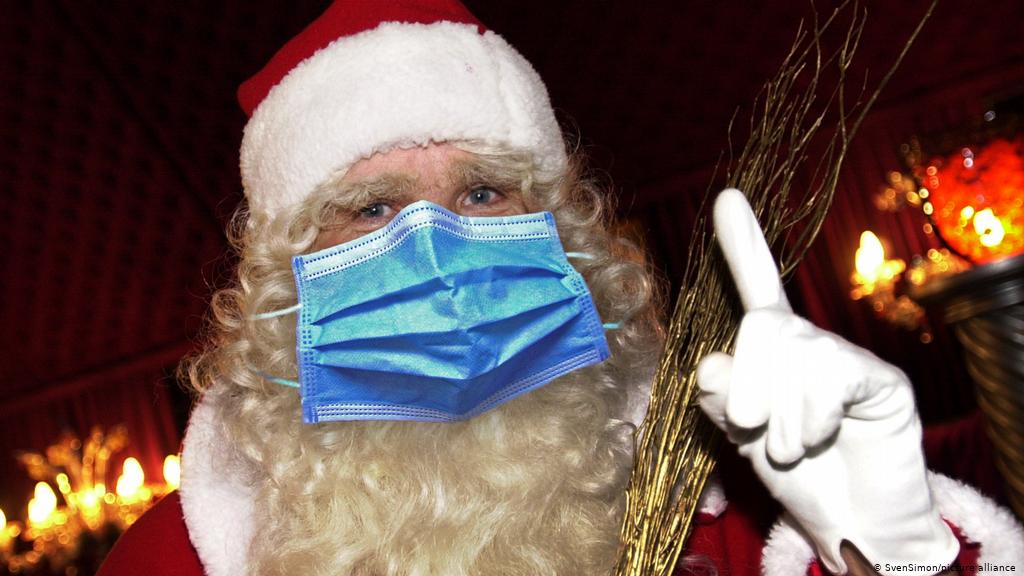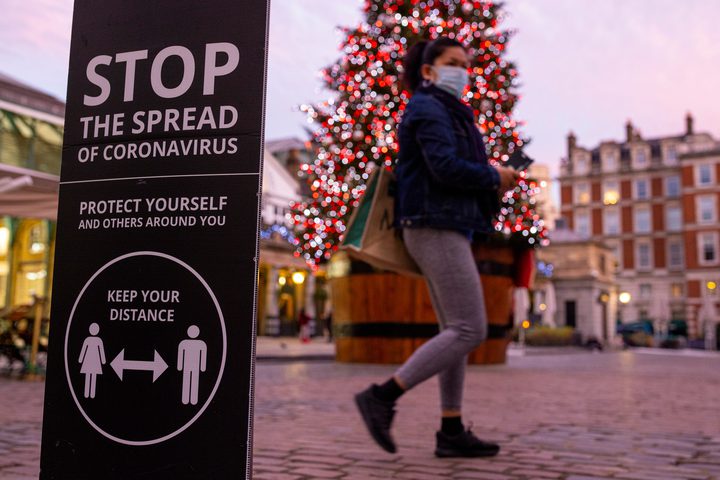An-Najah News -
It seems that tough Christmas lockdown looming in many countries around the world
The US
President Donald Trump and local governors have not outlined their plans for Christmas as the focus over the past few days has been discouraging people from going back to their families for Thanksgiving this week.
Last week, CNN host Jake Tapper interviewed Dr Anthony Fauci, the country's top infectious disease official, and asked him about how long the restrictions would be in place in the US.
Dr Fauci said that social distancing could still be required for some time into the new year, which prompted Tapper to say: “So, not until the second or third quarter of 2021, though? Christmas is probably not going to be possible?”
Dr Fauci said in response the country will see “a gradual accrual of more normality” as the weeks and the months go by, but added social distancing could last “well into 2021”.
France
The city of Colmar, Alsace, is seen back in 2017
The city of Colmar, Alsace, is seen back in 2017 (Getty Images)
France is preparing to ease its Covid-19 lockdown rules in the weeks leading up to Christmas. Since 30 October, a nationwide lockdown has been in place, only allowing people to leave their homes for specific reasons, such as food shopping, medical appointments, school or work or for exercise.
Government spokesman Gabriel Attal told Le Journal du Dimanche that a three stage process is expected to be announced by President Emmanuel Macron on Tuesday.
He said: “There will be three steps to easing in view of the health situation and of risks tied to some businesses: a first step around 1 December, then before the year-end holidays, and then from January 2021.”

The aim is to allow people to see friends and family for Réveillon, a meal which is eaten on Christmas Eve or early Christmas morning after people traditionally returned from the midnight church service.
Non-essential shops are predicted to open by 1 December so people can purchase presents. However, bars and restaurants could still have restrictions in place.
It’s not clear if the French will be allowed to travel to different parts of the country to spend time with their families or if churches will be open for Christmas mass.
On 20 November, Christmas Trees went on sale after they were ruled as “essential goods”.
Germany
The premiers of Germany’s 16 states met on Monday to decide what the next course of action for its citizens over Christmas will be.
Draft proposals have suggested a limit on gatherings to two households until 20 December, with potentially looser rules for the Christmas holiday period.
Germany saw a spike in infections in October and daily case numbers have exceeded 20,000 on certain days over the last few weeks.
As a result, restaurants, pubs, theatres, museums and swimming pools were shut again at the start of November.
Germans will be hoping that they will be able to gather together on Heiligabend, the evening of 24 December, for their celebrations. However, Chancellor Angela Merkel has yet to outline plans for it.
Christmas celebrations around the world
Show all 30
A man dressed as Santa Claus water skis alongside reindeer on the Potomac River in Alexandra, Virginia.
A volunteer dressed in a Father Christmas (Santa Claus) outfit distributes gifts to children of asylum-seekers, as they arrive at the Schoenefeld train station near Berlin on December 24, 2015, before being dispatched to various refugee centres in or near the German capital.
Leandro Wendell dos Santos, 14, wearing a Santa Claus costume, plays with kids as he walks along the alley of the Mare slums complex to distribute presents to children in Rio de Janeiro, Brazil. Leandro is part of a volunteer group of residents of Mare slums complex that distributes donated toys to children of the community.
Winter swimmers (L) look on as a man (R) wearing a Santa Claus hat and beard jumps into a pool carved into thick ice covering the Songhua River, to celebrate the upcoming Christmas, in Harbin, Heilongjiang province, China,

Spain
Over in Spain, where there is western Europe's second highest tally of infections after France, a six-month state of emergency was imposed at the end of October.
Regions subsequently imposed curfews and restricted travel to citizens.
The government of the Madrid region, one of Spain's worst-hit, said on Friday it would prevent people from leaving and entering for 10 days from 4 December to avoid mass travel around the 6 December Constitution Day holiday, which marks Spain’s transition to becoming a constitutional monarchy and democracy.
Much like the French and British, Spaniards will be hoping to ease lockdown measures so they can go to midnight mass with their relatives and friends on Christmas Eve.
As part of Nochebuena, as it’s called in Spain, sees people often meet early for a few drinks with friends then return home to enjoy a meal with the family.
How Spain will also manage restrictions leading up to the New Year and start of January are also yet to be confirmed by officials.
As Christmas Day as seen as more of a relaxed day in Spain, families will be keen to see each other on 6 January for Día de los Reyes Magos (Feast of the Epiphany), as that is when people tend to exchange gifts.
Italy
Many Italian regions are under partial lockdown to try to slow the outbreak, with restrictions due to stay in place until at least 3 December.
Prime Minister Giuseppe Conte warned the Italians they would not be able to give hugs and kisses to others to curb a potential surge in deaths and infections.
"We will have to spend the festivities in a more sober way. Big parties, kisses and hugs will not be possible, this would mean an abrupt rise in the (infection) curve in January," he said, adding: "We hope that we can still buy and exchange gifts."
Scandinavia
In Sweden, the country which has remained largely open during lockdown, some of its Christmas traditions are also being cancelled this year. Skansen, Stockholm's popular open-air museum, and its traditional Christmas market will be closed this year for the first time in its 129-year history because of restrictions.
Last week, Sweden set its strictest virus restrictions to date by banning public gatherings of more than eight people to curb a record number of infections in recent weeks that are burdening the healthcare system. A nationwide ban on alcohol after 10pm in restaurants, bars and nightclubs has also been brought in, meaning that Sweden could see a tougher Christmas this year.
Over in Norway, non essential shops are open even though there are restrictions, such as wearing face masks, in place in certain areas that are more densely populated, including the city of Oslo. Under current rules, private homes including gardens and cabins are not allowed more than five guests from outside the household. The current restrictions are in place until earlier December, given Norwegians hope of a normal Christmas.
Denmark faced tightened restrictions in the last few weeks after an outbreak of the virus was found in mink farms. It prompted seven municipalities to be placed into lockdown, with plans to keep them under restrictions until 3 December. However, some areas reopened on Friday, allowing people to freely move between the borders and restaurants to open for business. The country is projected to have a normal Christmas this year, which church services and family dinners being held on Christmas eve.
Japan
Japan, which has only started celebrating Christmas over the last few decades, has recently started to see numbers of coronavirus cases creeping up again - potentially putting its festive celebrations on hold.
Its number of cases hit a record number of 2,508 cases on Sunday, the fourth day in a row numbers have spiked.
Senior officials have said Prime Minister Yoshihide Suga’s government may reimpose limits on sports and other large events to curb the surge.
The limits could be applied in areas of the country reporting a sharp increase in cases, Nishimura said on a talkshow on the public broadcaster NHK.
As a result of the rising cases, Mr Suga has not outlined his plans for Christmas yet, suggesting he hopes that Japanese people will be able to celebrate with their families as usual by 25 December.
What the Oxford Covid vaccine announcement means for the public
Australia and New Zealand
Last week, New Zealand Prime Minister Jacinda Arden said plans to open a border between New Zealand and Australia for Christmas is now unlikely to happen due to the different ways the two countries are combatting the virus.
Australia is has a suppression strategy, which involves locking down hotspots where cases reach a certain threshold, New Zealand has an elimination strategy, which saw the country enter into a quarantine early on to prevent the virus from spreading.






